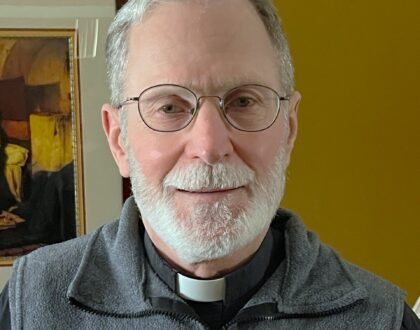Homily, June 18, 2023

From The Pastor
Is it possible that more people feel lost and helpless in the world today than in the time of Jesus? Statistically yes, if only by the sheer increase in world population. Yet, as much as the world has changed, and for the most part improved in two thousand years, so many remain without hope, direction, or meaning in their lives. For all the critical challenges we face, statistically there are fewer people starving today, there is less violence, injustice, and overall poverty. Hard to believe, isn’t it? How is it that so many appear lost and without hope?
This question has many faces. One is the primary need for basic stability and security of life in the necessities of food, shelter, safety, and a certain amount of personal autonomy. Human beings cannot and will not come to a mature sense of self-realization if they live in fear without food, shelter, safety, or a degree of control over their lives. Jesus saw and felt this as he traveled and preached to the crowds who were drawn to him seeking hope and peace. Before teaching the core of the Good News, Jesus saw the need to feed the hungry, heal the sick, and offer acceptance to the rejected.
Beyond these basic needs, Jesus felt pity for these ‘sheep without a Shepherd.’ This image refers to their lack of spiritual identity with any hope or confidence of the presence of God. What are sheep like without a Shepherd? They are lost, afraid, without direction, or know how. Jesus longs to give them the direction and identity they long for. Not unlike our time, the culture and society after the death of Jesus fell apart. By the time Matthew wrote his gospel, Jerusalem and the Temple had been destroyed. Jews in their own country were rejected and persecuted. They were thirsty and hungry for daily food as much as they longed for the help and evidence of God’s presence.
The second reading mirrors the same message of hope and redemption in a time of confusion and moral disorder. Through his conversion, St. Paul found and taught a new understanding of the living God beyond the Law of Temple religion. With the compassion of Jesus, Paul sees the weariness of the people as well as the remedy that will revive them. ‘Christ, while we were still helpless, yet died at the appointed time for the ungodly.’
What does St. Paul mean by the ‘helpless’? He means those without faith or hope. Those without any vision or meaning to their life beyond what they can grab and gain for themselves. He means those lost and unknowing in an aimless life of sin without any awareness of God. Like Jesus, Paul has a tone of pity rather than judgment or condemnation. Paul means to awaken people to the meaning and identity of God in their lives through the gift and action of the Lord Jesus.
The Christian message is a radical one that not all will understand or accept. It is a message built on faith and trust in the radical love of God who takes the initiative to come to us despite every human waywardness. This is the essential work of evangelization in our time. Many people have surrendered the meaning and direction of Church and religion for the sake of a faith that is built and dependent on the self alone. Self-defined, personal faith loses any true compass to the way and the truth of God. We do not and cannot save ourselves.
St. Paul has the gift of holy boldness and the courage of an unwavering faith. Paul unabashedly proclaims the initiative and gift of God that comes to us in Christ Jesus. In doing so, Paul makes clear who God is and what God intends for us. God is love and God wants unity and reconciliation with all God has made. God knows the weakness and ill-direction of the human spirit. For this very reason, ‘God proves his love for us in that while we were still sinners Christ died for us.’ While we were enemies of God, resistant and rebellious, God came to us in Christ Jesus that we might be reconciled to God. We have been justified in the dying and rising of Jesus. We are in right relationship with God through the mercy of Jesus through the forgiveness of his holy Cross.
The justification of Christ secures our right relationship with God giving us hope in the Divine promise. This is our meaning, direction, purpose, and living hope of life. God is with us, and we are with God. We are no longer aimless in search of an identity or purpose in life. Your identity is Christ. Your purpose is love. Your hope and direction is in God and the promise of heaven. This is the meaning and the foundation you stand upon in this life through thick and thin. It is your defense against sin and failure. You will fall and you will sin. God remains and the redemption of Christ is sure and eternal because it is given by God.
To live in this truth is to become a witness for those who do not yet know who they are in Christ. So many have given up on God because of the chaos and disorder of the world, and the lies of deception the world promotes. The world will always be in chaos, but in Christ you will always be in truth and right order with God. In that, your identity in Christ will be your peace. The table of the Lord will be the food of love that gives strength for the journey. See you at the table.
Father John Esper
Recent Sermons

Homily, March 30, 2025
March 27, 2025

Homily, March 23, 2025
March 20, 2025

Homily, March 16, 2025
March 11, 2025

